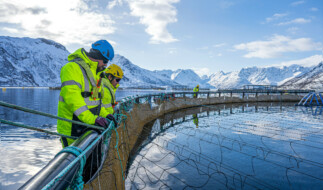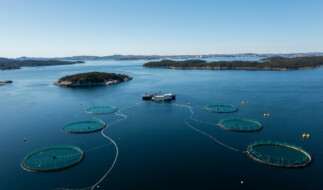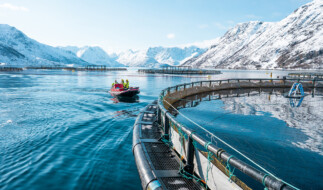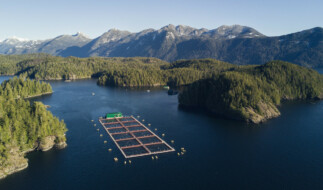Responsibly farmed salmon is a core component in many diets around the world and delivers high-quality, nutrient-rich, in-demand, and eco-efficient protein to support healthy and sustainable diets.
Supporting a sustainable and resilient global food system
Today's global food systems are managing multiple risks and unprecedented challenges, with the potential to drive widespread advancements in health, social, and environmental progress. Sustainable aquaculture, including responsibly farmed salmon, plays a central role in helping to achieve global dietary and sustainability recommendations. Let's explore how.
Aquatic foods seem to be a unique win-win. They have the high nutrient richness and can be produced with relatively low environmental impacts compared to terrestrial meats.Chris Golden, Harvard T.H Chan School of Public Health
Contributes a nutrient-rich food that meets dietary recommendations
Salmon, wild or farmed, is widely known as a nutrient-dense food. One serving provides high-quality protein, nearly 2g of omega-3 fatty acids, and essential nutrients like potassium and vitamins D, B12, and B5. Almost everyone can benefit from making dietary shifts to more nutrient-rich food options, including by eating more seafood. The Dietary Guidelines for Americans (DGA) recommend eating seafood twice a week and swapping high-fat meats with seafood as a way to help reduce intake of saturated fat and sodium. Choosing seafood like responsibly farmed salmon is one way to make every bite count.
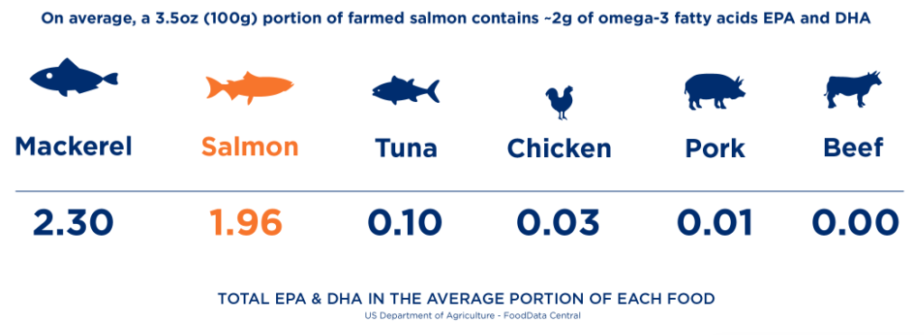
Omega-3 fatty acids (EPA & DHA) comparison by proteins.
Not only is salmon included in the United States’ DGA, it is recognized as a healthy component of food based dietary guidelines around the world. An example of this is Denmark, which recommends enjoying farmed or wild seafood every week as part of a healthy and sustainable diet.
Blue food consumption can help tackle malnutrition in all its forms, including undernutrition and over nutrition, and reduce diet-related chronic diseases like hypertension, obesity and certain types of cancers.
Offers an opportunity to improve nutrition with lower environmental footprint
Food systems are major contributors to environmental change - through pollution, land-use change, greenhouse gas emissions, and use of resources including water. Blue foods (aquatic animals, plants and algae cultivated and captured in freshwater and marine environments) can be an important part of sustainable food system solutions by lowering the environmental footprint and reducing pressures on already over-taxed terrestrial systems.
Responsibly farmed salmon is one of the most eco-efficient proteins available, using less fresh water and crops than animal-based foods.
Listen to Gonzalo Munoz discuss the importance of aquatic foods in sustainable food systems.
Supports thriving communities around the world
Of course salmon is food, so it's only healthy and sustainable if people choose it and enjoy it! Salmon is a staple food globally in all types of cuisines, from salmon maki to smoked salmon bagels to ceviche, you can find salmon in locations all around the world.
In addition to its role in supporting global cuisines, salmon aquaculture helps sustain the economic livelihoods of thousands of people around the world. Within the GSI network we employ over 24,000 full time employees directly and that doesn't include the value chain of organizations and individuals that support the work we do.

But continued improvements are needed for a resilient future
While this all sounds highly promising and salmon farming has made significant strides since it first began, we know there is a lot more to be done to improve the sustainability of farmed salmon to support healthy, sustainable and resilient food systems of the future.
Through collaborative efforts within GSI, we are committed to greater transparency, innovation and implementing industry-wide advancements to help ensure farm-raised salmon is one of the most eco-efficient animal-based proteins available while maintaining salmon’s nutritional integrity and reducing pressure on the ocean’s resources.
Frequently asked…
Is farmed salmon more or less sustainable than other animal proteins?
By many measures farmed salmon is one of the most sustainable animal proteins available. A common way to measure environmental impact in the food producing sector is to gauge how efficiently an animal can turn its food into protein, or what the industry calls feed-conversion ratio. Farm-raised fish have one of the lowest feed-conversion ratios and farmed salmon on average need 1.1 to 1.5 pounds of feed to produce 1 pound of body mass.
In addition, farmed salmon have a low carbon footprint, use less freshwater, and use less land than land-based animal sectors.
For more information check out our page on how farmed salmon contributes to sustainable food systems.
